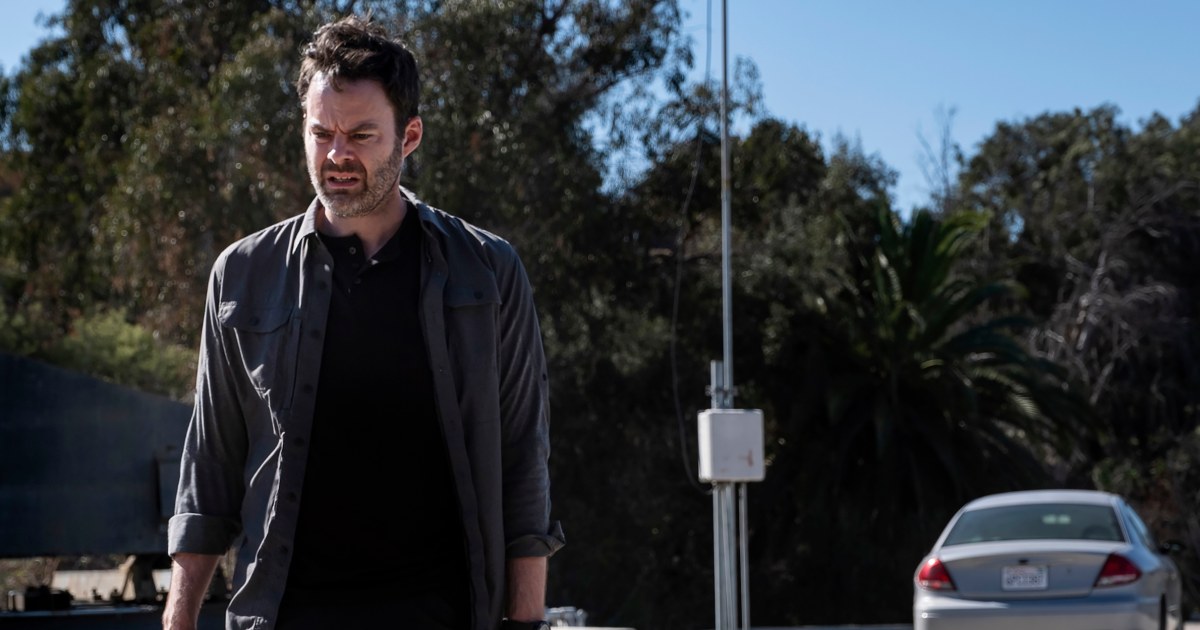
“Saturday Night Live” stars who helped define the show in the 2000s now play some of the most winning characters on television. Jason Sudeikis is relentlessly upset on “Ted Lasso.” Andy Samberg recently wrapped eight seasons as an irreverent detective on “Brooklyn Nine-Nine.” Will Forte is back for more crude antics on “MacGruber.”
But with the HBO dark comedy “Barry,” Bill Hader zigs where his former “SNL” castmates zag. In the series, which Hader also co-created and co-produces, he plays a stoned-faced hitman who, frustrated with his sordid profession and yearning for a fresh start, stumbles into a new life as an aspiring actor in Los Angeles.
Barry sees a chance for redemption in the form of Sally Reed (Sarah Goldberg), his earnest but self-absorbed actor girlfriend, and Gene Cousineau (Henry Winkler), his shambolic but soulful acting teacher. (Hader and Winkler have both won Emmy Awards for their performances.)
But like the mafia chieftains who rile Al Pacino in “The Godfather Part III,” Barry’s underworld associates — including the cowardly but vindictive Monroe Fuches (Stephen Root) — pull him back into a morally wretched existence he so desperately wishes to leave behind.
“Barry” is often laugh-out-loud funny, particularly when it skewers the vain ambition of striving young actors on the margins of Hollywood or tracks Barry’s fumbling attempts to conceal the bloody realities of his secret occupation. But it is also grim, fearless in showing ethically scrambled characters at their worst.
The third season of “Barry” debuts on HBO on Monday after a three-year hiatus. (Covid forced production to shut down in March 2020, and filming finally resumed last August.) Hader, a passionate cinephile with a keen eye for tragicomic details and action choreography, directed the first two episodes of the new season.
“He is so capable as a director,” said D’Arcy Carden, who has a supporting role on “Barry” as one of the title character’s fellow aspiring actors.
“I remember in season one, I had this moment where I was shocked by how good he was, but then I was like, ‘No, this is what he was born to do.’ He happens to be a brilliant comedian and actor, but that’s like a side note. He’s, like, a director.” (Hader reportedly plans to direct every episode of the show’s fourth season.)
In an interview with NBC News this month, Hader laid out his (spoiler-free) vision for the third season and reflected on some of the cinematic influences that have shaped the show.
The conversation has been lightly edited for length and clarity.
NBC News: I know there’s a lot about season three that you can’t spoil, but can you give me a general sense of Barry’s character arc this season?
Bill Hader: I can say: “The chickens have come home to roost.” [Laughs heartily.]
There’s a side to the character that can be sympathetic and even naïve in a childlike way, but we know after two seasons that he’s capable of committing heinous acts. Do the darker dimensions of this character’s personality weigh on you as an actor?
Not really, no. You do those [dark] scenes and then we’re on to the next thing, you know? You do a really intense scene and then it’s like, it’s lunch. [Laughs.] You’re sitting there chatting with the person who’s just been in that really intense scene.
It’s not some heaviness that sticks with you.
No, no, no. I think if I allowed it to get to that point I would never leave my house. [Laughs.]
I was stunned when I realized it’s been almost exactly three years since the season two finale aired. [The episode, “berkman > block,” aired on HBO on May 19, 2019.]
It’s wild.
In that time, the world has changed dramatically, with lots of chaos and tumult. Did the experience of the last few years change the DNA of the show at all, or change how you conceived of it?
You know, I think in some ways, yes. It wasn’t just the pandemic, but everything going on in the world, and how it took a toll on everyone emotionally. You were seeing people lose their minds and seeing people close to you get depressed and get a little crazy. I’m sure that found its way into this season, without a doubt.
I know you’re a serious cinephile, as anyone who has seen your Criterion Collection videos or heard you on “The Rewatchables“ podcast can attest. In directing episodes of this season, were there particular films that were touchstones for you?
The director of cinematography and the first assistant director and I watched a couple of things just to get the idea of blocking [action]. “Rosemary’s Baby” was a movie we watched. I remember watching some of “Burn After Reading,” the Coen brothers movie.
In general, you watch a ton of stuff and then it kind of, like, seeps into the show organically in ways you don’t even realize. It wasn’t even until I was [sound] mixing the last episode of season two, when Barry is going on a rampage through the monastery, where I went, “Oh my god, this is ‘Taxi Driver,’” you know? [Laughs heartily.] “Unforgiven,” too. The rain and all that.
It’s interesting you mention “Taxi Driver,” because the first two seasons gave me a strong Paul Schrader vibe. [Schrader wrote the “Taxi Driver” screenplay and has since gone on to direct several films about disaffected loners.]
Oh, yeah, yeah. The loner person.
The alienated protagonist.
If we had had a v.o. [voiceover track], it would have been full Schrader. It would have been me sitting in a room writing stuff down, whatever Oscar Isaac [“The Card Counter”] and Ethan Hawke [“First Reformed”] were doing in his last two movies.
I love his stuff, but weirdly my favorite movie of his is “Mishima: A Life in Four Chapters.” He really knocked it out of the park with that movie. It’s a man driven by these ideals that lead to self-destruction.
If you watched the first two seasons and you believe you know how far the show will go in terms of Barry’s morality, what do you think will be the biggest surprise about the new batch of episodes?
Barry’s really horrible to people this season. When we find him, he’s hopeless and he’s still looking for a purpose, as he says. But we had to write things honestly, and there are a lot of scenes in it that are pretty tough to watch, you know?
It’s like: Well, we could try to make it [horrible behavior] funny, but that’s not funny, so you have to play it honestly. If you downplay it or say, “He’s bad, but only to this point” — that is weirdly more offensive to me. You want to show him in all his honesty.
You can’t really make excuses for a guy who is fundamentally a killer.
That doesn’t feel real. I like true crime stuff, and you never see that. You never see the murderer who can live a normal life and not at least be a compete and total monster to the people that love them, or be alienated from them. Barry tries to hide it, but this season we very consciously decided that everything needed to come out.
Source: | This article originally belongs to Nbcnews.com










